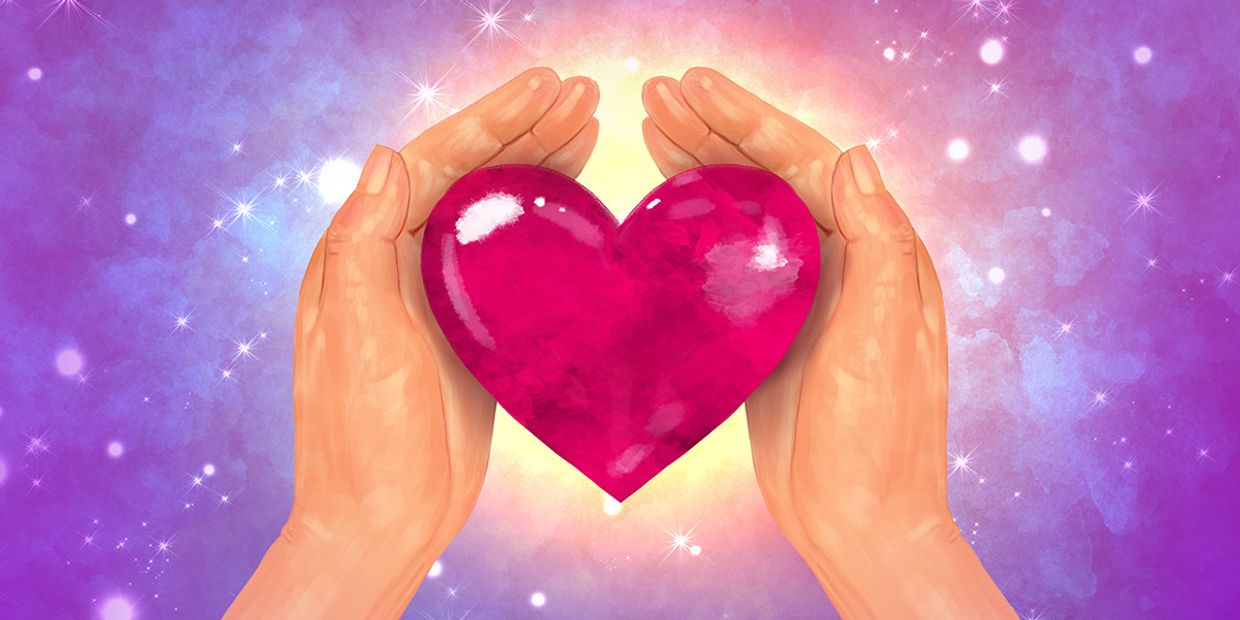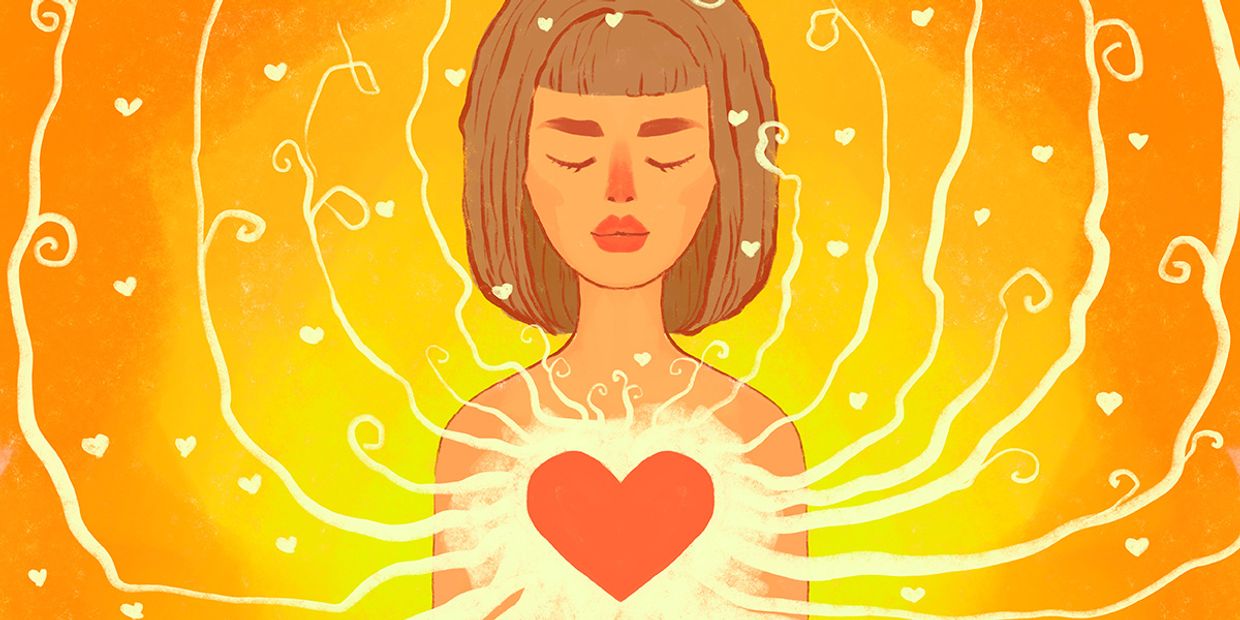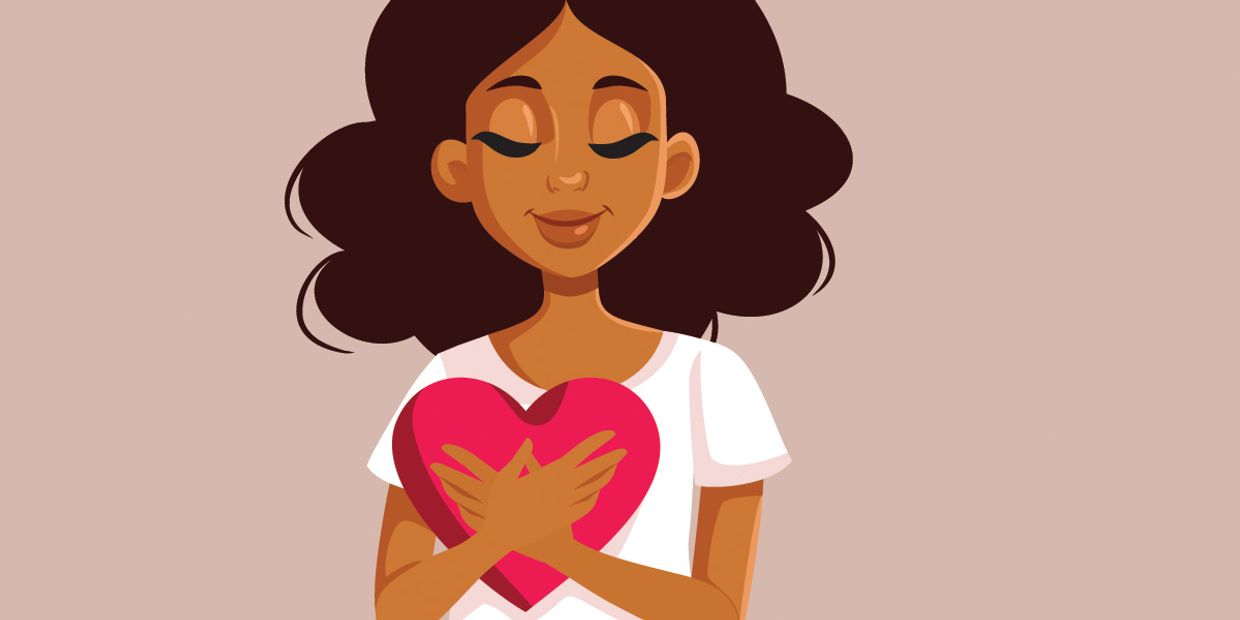
To pay for your reading on your telephone bill, simply call
Instantly message our featured psychics online via psychic messenger.
Click to start
Register now to start your reading online. PSYCHIC MESSENGER- Cheapest psychic service in the UK
- Our readers are available 24/7
- 100% confidential service
- In-depth, concise, personal readings
- Thousands of 5* reviews
Published 09/09/2024 • Updated 09/09/2024 by Louise Emma
How to Forgive Yourself: Guide to Self-forgiveness
Guilt, shame, remorse and regrets infect the mind and drag you down, which is why you should learn how to forgive yourself and let it all go. It's a fierce and loving rebellion against negative self-talk and all the guilt and shame that surfaces in our heads.
We are all flawed people, and there is no perfect person who sails through life without making a thousand mistakes along the way (admittedly, some are bigger than others, but we all make them).
We only have one life, and living in the past and dwelling on mistakes can lead to an unhappy existence and take a toll on your physical and mental health. If you want to regain control of your life and take the first step towards healing, read our step-by-step guide on how to forgive yourself.
The 4 Rs of Self-Forgiveness
The self-forgiveness process is all about the 4 R's. The 4 R's make the forgiving process easy to remember.
- Responsibility (Acknowledging what you've done)
- Remorse (Feeling truly sorry for your actions)
- Restoration (Writing your wrongs)
- Renewal (Renewing your commitment to not repeat the mistakes)
Each of these steps is a loving action towards yourself. Each one will help ease the negative emotions and lighten your heart.

Responsibility
The first step in learning how to forgive yourself is taking responsibility for what you have done. It entails owning your behaviour and acknowledging what happened and your role. This isn't self-recrimination; it's a reflection in which you acknowledge that you are human – fallible – like everyone else.
Taking responsibility frees you from denial or blame and brings you into self-awareness, enlightening you about your own actions and their consequences. Owning your piece of the pie is the beginning of letting go so that you can forgive yourself in the cleanest way possible.
Remorse
Once you've taken full responsibility, you naturally feel remorseful a little bit more. And that's because realisation has hit you like a tonne of bricks, and you care. If you don't care, you're not remorseful.
Feeling remorse is essential. It means you know you did wrong and are upset by your actions. You still can feel sad about it. You can feel disappointed about it, as acknowledging these feelings is part of the healing process.
Restoration
Restoration is making up for something – either to someone else or you. Repairing your mistake or doing a good deed to try and make up for your actions is part of the restoration step. Acting on the lesson means doing something positive to compensate for a situation.
If your mistake only affected you, it might be a moment to be more compassionate towards yourself, to restore your relationship with yourself, and the ways you often treat yourself less lovingly because you screwed up.
Renewal
This final beautiful act of self-forgiveness is renewal – starting over or retesting your commitment to yourself after taking responsibility, remorse, and rebalancing. You can now breathe. The baggage is gone.
What you have for yourself by forgiving yourself is the opportunity for upward and personal growth – truly living in the present as a renewed being instead of carrying forward the pain of the past.
Enjoy the lightness and a guilt-free mind and take pride in the fact that you are big enough to accept your mistakes and, more importantly, learn from them and prevent them from being repeated. This is the relief and freedom that self-forgiveness brings.

How to Forgive Yourself and Move On Step-by-Step
Forgiving ourselves is a far bigger battle than forgiving someone else. You may believe you do not deserve forgiveness due to the overpowering feelings of guilt and shame infecting your mind.
Still, when you can accept, process and deal with those emotions, you are already winning the battle and can learn how to forgive yourself and heal.
Forgiveness is one of the most empowering exercises you can go through as it liberates you from the heavy shackles of guilt, allowing you to find peace and new opportunities.
Self-forgiveness is not about excusing your actions but taking responsibility, accepting the consequences, and learning from mistakes. Here's our step-by-step guide on how to forgive yourself and free your mind, empowering you to take control of your life.
Step 1: Understand Your Emotions
The first step in learning how to forgive yourself is to accept your mistake and identify the emotions connected to your experience. Sit with your feelings—do you feel guilt, remorse, or sadness? Allow yourself to feel the emotions and the reason behind them. When you can feel and understand your feelings and what is causing them, you have completed the first step towards your self-forgiveness journey.
Step 2: Take Responsibility
To take ownership of the error means to accept your role without blame or excuses. It is about accepting the consequences of your actions for yourself and the others involved. This is a liberating step in learning from failure. It can lead to healing, making amends, forgiving, and finding redemption in the light of having realised when you broke your moral code. Awareness leads to growth.
Step 3: Be Kind to Yourself
After bearing the burden of guilt, being kind to yourself is necessary if you want to move on. Kindness is one of the greatest triggers for self-forgiveness.
Doing a good deed a day can do wonders for moral growth and help you give something good back to the world, which in turn helps you feel as if you deserve a little kindness. Try saying positive statements to yourself every time you make a positive contribution to remind yourself you are on the right path and taking the right course of action.
Read our guide on How to Love Yourself.
Step 4: Show Remorse
If you know you feel true remorse, you are ready to learn how to forgive yourself. Genuine remorse means feeling compassion for victims and understanding how your actions affected them. Again, don't drown in the guilt; use it to change your ways.
Write in a journal, talk to someone you trust, or even meditate. Remorse isn't about self-hatred and criticism—it's about showing that you care and want to make it right.
Step 5: Make Amends to Others and Yourself
Making amends is an incredibly important part of forgiving yourself, especially if your actions hurt others. Do what you can to make amends or redress the balance. This might mean changing your behaviour, apologising or both. If you hurt only yourself, begin to repair the relationship with yourself.
What do you need to do to heal the damage you've done? You may need to set better boundaries, rededicate yourself to self-care or start practising new, healthy habits. You may need to pay a sum of money or sincerely apologise to someone. Anything you can do proactively to restore your mistake helps bring closure and can break the cycle of guilt.
Step 6: Learn From the Experience
The learning experience is where the growth part happens. Take some time to sit with your experience and reflect on what this experience taught you.
What can you do differently next time? What can you do to avoid making the same silly mistake again? How have you become a smarter or more compassionate person as part of your experience of making this mistake? When you learn from your past, you turn it into a life lesson rather than the thing that holds you back, and you can move forward with life.
Don't let your mistakes define you; learn from them to create a better future.
Step 7: Move On
Moving on is the last and most freeing step in the process. You've reflected on the negative experience, accepted the mistake, made amends, and learned from past wrongdoings.
Moving on does not mean forgetting what happened. Instead, it means that you are no longer carrying it with you. You have done the work; now it is time to allow your self-forgiveness. Forgiving yourself for your blunders is the greatest gift you can give to your future.
Why Is Self-forgiveness So Difficult?
Self-forgiveness is difficult because we tend to have harsher self-judges than others. We're full of 'I wish I'd done something different, I should have known better' and filled with guilt and regret. This is one of the big reasons why self-forgiveness is so hard. You're holding yourself to a much higher standard than you would any other person.

Benefits of Self-forgiveness
Self-forgiveness is a uniquely transformative act with far-reaching implications for your well-being.
Forgiving yourself opens the door to emotional, physical, and spiritual healing that can lead to improved peace of mind and greater freedom in life.
Self-forgiveness and a positive attitude benefit mental health, physical health, and spiritual growth. While we can forgive others for harming us, we also can forgive ourselves for wrongdoings and harmful acts by others. It's a practice that greatly benefits your mental health and daily life.
Mental Health
The mental health benefit is the most crucial reason you should learn to forgive yourself. Unresolved guilt, shame or regret can contribute to chronic stress and anxiety and the accompanying loss of well-being, including depression.
According to research and a study published in the Journal of Health Psychology (2012) and Frontiers in Psychology (2018), self-forgiveness can reduce these negative mental health effects.
For example, in a recent study using a questionnaire about stigmatising discrimination, researchers found that self-forgiveness can help buffer the stigma that might plague an individual. People who walk around with unresolved self-critical feelings tend to be stuck in some sort of prison of self-blame.
Self-forgiveness is a key that turns the lock and lets you walk out of that prison.
Physical Health
Practising self-forgiveness is a healthy choice for your emotional well-being and your body. Chronic guilt, stress, and anxiety raise blood pressure and weaken the immune system's overall ability to fight disease.
Studies in Psychosomatic Medicine show that self-forgiveness reduces stress and can lower the risk of stress-related illness.
When you let go of emotional 'weight', your body can finally let go and relax. Better physical health, more energy, and a healthier, more positive life are naturally the results.
Spiritual Healing
From a soul level, practising self-forgiveness brings powerful healing and spiritual awakening.
By forgiving yourself, you will open your heart and mind to being back into alignment with your spiritual core, to the real 'you'. This short-circuits the negative impact of 'dragging baggage' on your spiritual journey and clears out the blocks standing between you and your real purpose.
When you forgive yourself, you open to a spiritual transformation, paving the way for more peace, love, and joy to enter your life.
Psychic Readings
Contact Trusted Psychics UK because you deserve to learn how to forgive yourself and be free from the heavy shackles of guilt and shame.
A live psychic reader can guide you with soul-soothing advice that will lead you to true self-forgiveness. We can live a life filled with guilt, remorse, and regrets, or we can choose to take control and do something about it: accept our faults, feelings, and mistakes, learn from them, and forgive ourselves. Revitalise your soul's energy today and get powerful insights and psychic guidance from Trusted Psychics.
When we look at a situation in our lives, we often see it from one perspective. When you speak with a professional psychic, they can find the initial cause of an issue or mistake, find, and understand the emotional and spiritual blocks getting in your way of forgiving your past misdemeanours and give you steps on how to overcome any blockages preventing you from moving on and living in the guilt-free present.
You can have the reassurance you need with intuitive psychic readings, spiritual advice, deep insights, and reflections from any of their gifted psychics over the phone or on Live Messenger.
Release the negative feelings of guilt and strive to find self-love and a sense of peace again.
FAQs on How to Forgive Yourself
How Do I Let Go of Guilt and Forgive Myself?
You are relieving yourself of guilt, and loving yourself after a mistake requires accepting, apologising, and making amends.
Accept that you made a mistake as you are only human, and making mistakes is part of human nature.
Cross-examine the event without judgment but with compassion. Learn from the event to prevent repeating the mistake. Then, meditate on the experience, write about it in a diary, or talk to someone for support, like a friend, mental health professional or live psychic reader for spiritual healing.
Letting go means accepting your faults and giving yourself permission to continue your path.
What If I Can Never Forgive Myself?
If you believe you could never forgive yourself, ask yourself why exactly. Often, it's because of having unrealistic expectations of yourself or being a perfectionist.
We judge ourselves far more critically than we would others. Remember that any guilt you're holding on to isn't furthering you and only keeps you in the past.
Try speaking to a family therapist or for a more spiritual approach, a psychic reading, or anything that can bring you clarity to be free from blaming yourself.
Forgiving yourself is a journey with gradual steps, and sometimes, you need to start with the smallest of steps to get the door cracked open to healing and self-compassion.
How Do I Accept My Past Failures?
Recognise the failure, learn from it, and view it as a learning curve: 'How can I grow from this?' "How can I make sure I never repeat that same mistake again?" Recognise that mistakes are simply a natural part of daily life; we will always slip up and fall.
The key is to accept you made a mistake, process your thoughts and feelings, and learn from the mistake so you make sure it doesn't happen in the future. Shift the focus from failure to knowledge and growth.
Does Self-forgiveness Work?
Genuine self-forgiveness is a potent psychological tool that enables us to let go, move forward, and transform.
People who can forgive themselves have lower levels of stress, anxiety, and depressive symptoms. When you forgive yourself, the emotional baggage and self-hatred gradually evaporate.
Self-forgiveness creates a bridge to integrating self-acceptance to improve our mental health and relationships. It works by helping us reconcile with ourselves, integrating our strengths and shortcomings, and moving us toward a healthier growth-oriented mindset rather than one focused on guilt.
What Are the Consequences of Not Forgiving Yourself?
If you cannot forgive yourself, the all-consuming feelings of utter guilt and remorse can eat you up, which is mentally draining and physically exhausting.
Carrying unresolved guilt and self-recrimination means maintaining a chronic state of shame, anxiety, and depression. It may even result in physical illness as the body withholds vital energy to combat stressful conditions.
The longer guilt is held, the deeper the blockages of emotional energy that make it harder to move on and live fully. For example, feelings of guilt can contaminate your relationships over time, leading to isolation from those who can help you.
Contact our team of highly skilled psychics at Trusted Psychics and learn more about forgiveness and the benefits it will give you spiritually and mentally.
Related Articles
What to Do If You Cheat on Your Partner.
How To Contact A Trusted Psychic
Phone a live Psychic 24 hours a day
View all our live phone psychic and tarot readers online.
View All Live readersMessage a live Psychic 24 hours a day:
View all our live messenger psychic and tarot readers online.
launch messengerRecent Articles From the Trusted Psychics Blog

What Can a Psychic Reading Tell You? By Trusted Psychics
Discover what a psychic reading can reveal about love, relationships, career direction, and spiritual growth. Learn how readings work, what to expect, and why Trusted Psychics UK offers ethical, 24/7 support.

Trusted Psychics: Affordable Psychic Readings
Get accurate, affordable psychic phone readings from Trusted UK Psychics. Transparent pricing, 24/7 availability & real spiritual insight. From just 50p/min.

Real Customer Stories: How a Psychic Reading Changed My Life
Our guide on How a Psychic Reading Changed My Life. Find real insight with 5-star online Trusted Psychic readers. Verified, clear pricing & concise insight 24/7.

Top 10 Reasons People Want a Psychic Love Reading
Discover why more people than ever are turning to psychic love readings. Exclusive insights from 1.5M UK callers. Get clarity, comfort, & accurate guidance today.

Psychic Reading Near Me
Looking for a psychic reading near you? Get instant, accurate insights from Trusted Psychics UK. 24/7 phone & online readings with real, vetted psychic experts.

What Can a Psychic Reader Tell You?
Discover what a psychic reader can really tell you in love, career & life. Learn how psychic readings by phone work & how to find the best psychics online.

